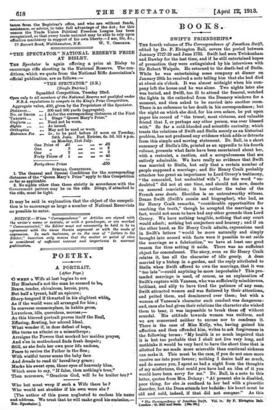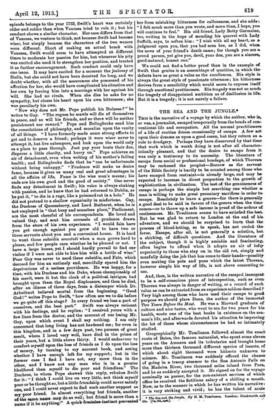BOOKS.
SWIFT'S FRIENDSHIPS.*
THE fourth volume of The Correspondence of Jonathan Swift, edited by Dr. F. Elrington Ball, covers the period between
January 1727-28 and June 1733. Swift had seen Twickenham
and Dawley for the last time, and if he still entertained hopes of promotion they were extinguished by his interviews with
Sir Robert Walpole. He returned to the death-bed of Stella.
While he was entertaining some company at dinner on January 28th he received a note telling him that she had died at about six o'clock. It was almost midnight when his com- pany left the house and he was alone. Two nights later she was buried, and Swift, too ill to attend the funeral, watched the lights in the cathedral from the Deanery windows for a moment, and then asked to be carried into another room. There is no reference to her death in his correspondence; but
the night on which she died, for his own solace, he put upon paper his record of "the truest, most virtuous, and valuable friend that I, or perhaps any other person, was ever blessed with." So far a cold-blooded and scientific curiosity, which treats the relations of Swift and Stella merely as an historical problem, has not produced any evidence which adds or detracts from this simple and moving statement. Dr. Ball, in a short summary of Stella's life, printed as an appendix to his fourth volume, presents what facts have been ascertained about her, with a restraint, a caution, and a scrupulousness that are entirely admirable. We have really no evidence that Swift was married to Stella, but only that a certain number of people supposed a marriage ; and Sir Henry Craik probably attaches too great an importance to Lord Orrery's testimony, "the concealed, but undoubted wife"; for the word " un- doubted " did not at one time, and should not now, denote an assured conviction; it has rather the value of the French sans doute. Sheridan is an untrustworthy witness. Deane Swift (Swift's cousin and biographer), who had, as Sir Henry Craik remarks, "considerable opportunities for reaching the truth," though he accepted the marriage as a fact, would not seem to have had any other grounds than Lord Orrery. We have nothing tangible, nothing that any court would admit ; nothing but conjecture and hearsay ; and if on the other hand, as Sir Henry Craik admits, expressions used in Swift's letters "would be more naturally and simply brought into accord with facts were it possible to set aside the marriage as a fabrication," we have at least one good reason for thus setting it aside. There was no sufficient object for concealment. The story, even as Sir Henry Craik relates it, has all the character of idle gossip. A dean married by a bishop in a garden, and the reply attributed to Stella when Swift offered to own the marriage, that it was 'too late "—could anything be more improbable ? This pre- tended marriage is used, of course, as an explanation of Swift's rupture with Vanessa, who was sufficiently mischievous, brilliant, and silly to have tired the patience of any man. Swift attracted women and was flattered by their attentions,: and petted them, and domineered over them; but with a woman of Vanessa's character such conduct was dangerous: and, once she had given their relations the character she wished them to bear, it was impossible to break them off without
scandal. His attitude towards women was uniform, and we are concerned neither to excuse nor to condemn it.
There is the case of Miss Kelly, who, having gained his affection and then offended him, writes to ask forgiveness in the following terms : "My health is so much impaired that it is but too probable that I shall not live very long, and methinks it would be very hard to have the short time that is allotted for me made more miserable than continual sickness
can make it. This must be the case, if you do not once more
receive me into your favour ; nothing I desire half so much, and do assure you, I spent so bad a night from the thoughts of my misfortune, that could you have had an idea of it you would have been sorry for me." Dr. Ball, in a note to this letter, quotes from Mrs. Delany : "At present she is disabled, poor thing, for she is confined to her bed with a pleuritic disorder, but the Dean attends her bedside: his heart must be old and cold, indeed, if that did not conquer." As this
• The Correspondence of .Tonathan Swift. Vol. iv. By F. Elrington Ban. London : G. Bell and Bons. [108, f3d.]
episode belongs to the year 1733, Swift's heart was certainly older and colder than when Vanessa tried to rule it ; but his conduct shows a similar character. Her case differs from that of Vanessa, we venture to think, not because Swift had become wiser, but simply because the characters of the two women were different. Short of making an actual break with Vanessa, Swift would seem to have attempted at different times to moderate her passion for him, but whenever his pity was excited she used it to strengthen her position, and treated it as further encouragement. Such conduct could only have one issue. It may have excited for a moment the jealousy of Stella, but she could not have been deceived for long, and we doubt whether, with all the assurances she possessed of his affection for her, she would have complicated his situation and her own by forcing him into a marriage with her against his Will. She had no rivals. When she dies be asks for no sympathy, but closes his heart upon his own bitterness ; she was peculiarly his own.
"Now why does not Mr. Pope publish his Dulness F" he writes to Gay. "The rogues he mawls will die of themselves in peace, and so will his friends, and so there will be neither punishment nor reward." Pope and Bolingbroke send him the consolations of philosophy, and moralize upon the vanity of all things. "I have formerly made some strong efforts to get and to deserve a friend; perhaps it were wiser never to attempt it, but live extempore, and look upon the world only as a place to pass through. Just pay your hosts their due, disperse a little charity, and hurry on." Pope achieves an air of detachment, even when writing of his mother's failing health ; and Bolingbroke finds that he "can be unfortunate without being unhappy." "Prudence will make us desire fame, because it gives us many real and great advantages in all the affairs of life. Fame is the wise man's means ; his ends are his own good and the good of society." One never finds any detachment in Swift ; his voice is always shaking with passion, and he knew that be had returned to Dublin, as be put it, "to die in a rage, like a poisoned rat in a hole." He did not pretend to a shallow equanimity in misfortune. Gay, the Duchess of Queensberry, and Lord Bathurst, when he is not employed in "that busy and senseless place," Parliament, are the most cheerful of his correspondents. He loved and valued Gay, and sent him counsels of prudence drawn from the store of his own experience. "I would fain have you get enough against you grow old to have two or three servants about you and a convenient house. It is bard to want those subsidia seneetuti when a man grows hard to please, and few people care whether he be pleased or not. I have a large house, yet I should hardly prevail to find one visitor if I were not able to hire him with a bottle of wine." Poor Gay was never to need these subsidia, and Fate, which decreed for him an untimely end, mercifully spared him the deprivations of a useless providence. He was happy, for a time, with his Duchess and his Duke, whose championship of his merit, were it but the cloak of a political intrigue, had brought upon them the Royal displeasure, and then he died, after an -illness of three days, from a distemper which Dr. Arbuthnot believed mortal from the beginning. "Good God " writes Pope to Swift, "how often are we to die before we go quite off this stage ? In every friend we lose a part of ourselves, and the best part." Swift was always reticent with his feelings, and he replies: "I received yours with a few lines from the doctor, and the account of our losing Mr. Gay, upon which event I shall say nothing. I am only concerned that long living has not hardened me; for even in this kingdom, and in a few days past, two persons of great merit, whom I loved very well, have died in the prime of their years, but a little above thirty. I would endeavour to comfort myself upon the lose of friends as I do upon the loss of money, by turning to my account book, and seeing whether I have enough left for my support; but in the former case I find I have not, any more than in the other, and I know not any man who is in a greater likelihood than myself to die poor and friendless." The Duchess, to whom Pope showed this reply, rebukes Swift for it: "1 think I could live on very little, not think myself poor or be thought so, but a little friendship could never satisfy one, and I could never expect to find such another support as my poor friend. In almost everything but friends, another of the 8(1MQ name may do as well; but friend is more than a name if it be anything." A quick feminine instinct prevented her from mistaking bitterness for callousness, and she adds : "I felt much more than you wrote, and more than, I hope, you will continue to feel." His old friend, Lady Betty Germaine,. too, writing in the hope of mending his quarrel with Lady Suffolk, says, to soften him : "I wish with all my heart, as a judgment upon you, that you had seen her, as I did, when. the news of your friend's death came; for though you are a proud parson, yet give you, devil, your due, you are a sincere, good-natured, honest one."
We could not find a better proof than in the example of Swift that genius is an assemblage of qualities, in which the defects have as great a value as the excellences. His style is always the great style of passionate utterance ; his bitterness. derives from a sensibility which would scorn to express itself through emotional prettinesses. His tragedy was not so much, the tragedy of disappointed ambition as of disillusion in life.. But it is a tragedy; it is not merely a failure.











































 Previous page
Previous page